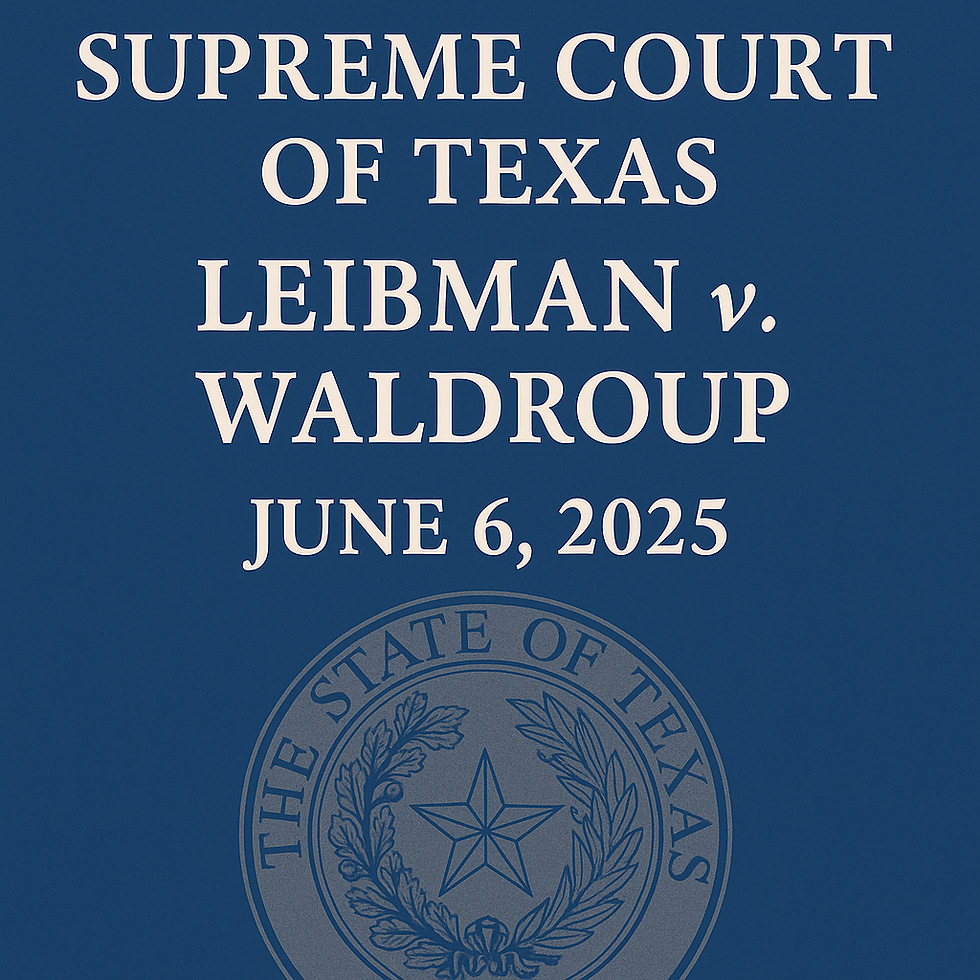Clarifying the Limits of Vicarious Liability for Nonprofit Health Organizations in Texas
- Zeke Moya
- Jun 1, 2025
- 2 min read
By Zeke Moya, Trial Counsel for Petitioner in Renaissance Medical Foundation v. Lugo
On May 23, 2025, the Texas Supreme Court issued a highly anticipated decision in Renaissance Medical Foundation v. Lugo, addressing whether a nonprofit health organization (NPHO) can be held vicariously liable for the alleged negligence of its employed physician. I had the honor of serving as trial counsel for the petitioner, Renaissance Medical Foundation, in this pivotal case.
The Core Legal Question
At issue was whether Chapter 162 of the Texas Occupations Code—specifically Section 162.0021, which prohibits NPHOs from interfering with or controlling a physician’s professional judgment—modifies the traditional common law rules of vicarious liability.
The plaintiff alleged that a neurosurgeon employed by the NPHO negligently caused injury during surgery. The NPHO moved for summary judgment on the grounds that it could not be held vicariously liable where the alleged negligence stemmed from the physician’s independent medical judgment, which the organization is statutorily prohibited from directing or controlling.
Supreme Court’s Holding
The Texas Supreme Court affirmed the lower courts’ denial of summary judgment, but did so while establishing a new legal framework for evaluating vicarious liability claims against NPHOs. Key takeaways from the majority opinion authored by Justice Brett Busby include:
Statutory Limits Matter: A nonprofit health organization cannot be held vicariously liable where doing so would require it to control or interfere with its physician’s independent medical judgment in violation of § 162.0021.
Not a Blanket Immunity: NPHOs can still be vicariously liable in circumstances where the alleged negligence does not involve independent medical judgment, or where the organization exercised impermissible control in violation of the statute.
Summary Judgment Guidance: The Court outlined a path for future litigants, explaining that NPHOs may defeat vicarious liability claims at the summary judgment stage if they can show that the conduct in question falls within the physician’s exclusive domain of professional judgment.
Why This Matters
This is the first time the Texas Supreme Court has squarely addressed how Chapter 162 interacts with common-law employer liability. The opinion reconciles statutory protections for medical autonomy with long-standing agency principles, providing a roadmap for future litigation involving hospitals, physician groups, and nonprofit health systems.
While the Court ultimately affirmed the denial of our summary judgment motion, it accepted our core premise: that Texas law places meaningful limits on when NPHOs can be held liable for the conduct of their physician employees. The Court invited a renewed summary judgment motion under the clarified standard, which now more clearly delineates when an NPHO’s right of control exists—and when it doesn't.
My Reflections as Trial Counsel
This case presented a unique opportunity to shape the intersection of health law and tort liability in Texas. From the outset, we argued that imposing liability where an NPHO is prohibited from exercising control would create an untenable legal contradiction. The Supreme Court’s opinion validates that concern and provides important doctrinal clarity.
As healthcare law continues to evolve, this decision will stand as a touchstone for how courts assess the boundaries of vicarious liability within the context of professional autonomy.
Zeke Moya
Partner, Roerig, Oliveira & Fisher, LLP
Trial Counsel for Petitioner in Renaissance Medical Foundation v. Lugo
Insurance Defense | Healthcare Litigation | Strategic Risk Management





